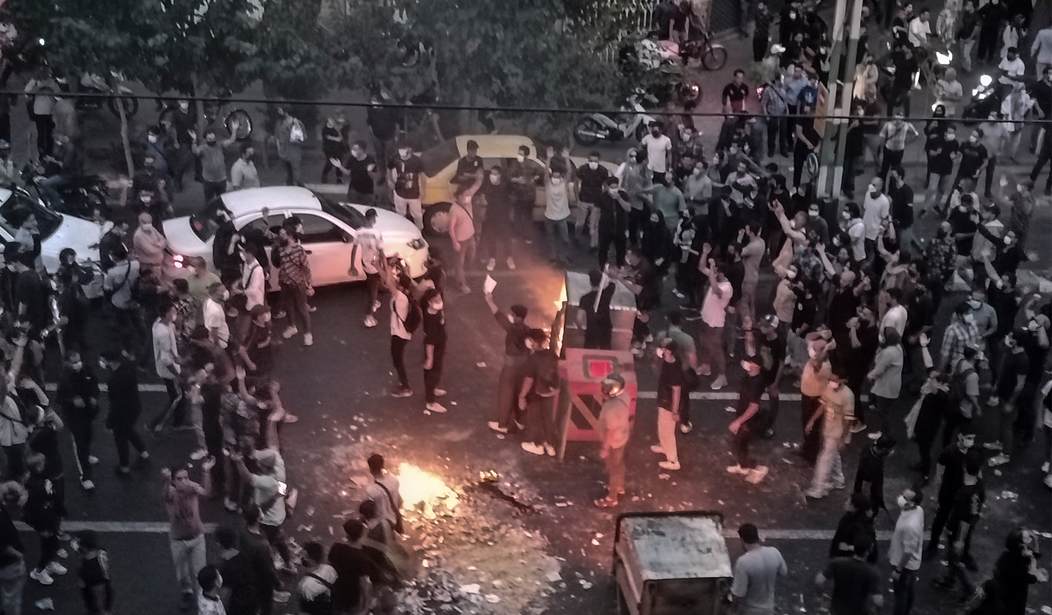Hossein Amirabdollahian, Iran’s foreign minister, accused Israel and Western intelligence services of planning to divide the country and start a civil war.
The announcement amplifies the question on everyone's mind more than sixty days after the beginning of the country’s new revolution: where is Iran heading to?
The authorities, or those with some organic connections to them, have started, long before the minister's musings, to whisper one answer: civil war, like those in Syria and Libya. A troubling image of scenes of destruction, killing, and displacement of millions of people, like what happened in Syria, comes to mind.
The benefit reaped by the government from spreading this image is clear and needs no explanation. But a few points need to be mentioned:
In 1978, the official media of the Shah's regime highlighted the terrible image of Lebanon’s civil war, reminding the demonstrators who took to the streets against the Shah in Tehran of Lebanon's painful fate. A scenario that never came true in Iran.
However, those who now warn against civil war argue that the regime of the Shah was not comparable to that of the mullahs because the latter is first an ideological one that will fight to the end. In this way, the civil war scenario can materialize.
Nevertheless, civil war is not dependent on the stubbornness of the rulers but the result of certain social-historical preconditions.
Unlike Syria, Libya, and Lebanon, countries born a century ago in the aftermath of the fall of the Ottoman Empire, Iran, with nearly three thousand years of independent national coexistence, has never witnessed a massive civil war.
Recommended
The contemporary history of Iran consistently portrays a relatively strong central government. Even during the weakest of those governments, i.e., the Qajar dynasty, no regions acted independently from the central government. Iranian ethnic groups have never talked about separatism except with foreign instigation. For example, unlike Iraq, Turkey, and Syria, the Kurdish people's movement in Iran has never claimed separatism, and its historical claim is limited to autonomy. The Azeris of Iran, the most significant ethnic minority, have not even talked about autonomy except at one point with provocation from the Soviet Union under Stalin during World War II.
Iran's governments, even during the Qajar and Safavid periods, both basically from the Azeris of Iran, never leaned on the ideals, strength, or capabilities of an ethnic group, tribe, or a specific social sector in the country and did not represent the wishes or intentions of such groups. Unlike Bashar Assad’s Syria, where the Alawite minority holds power, or even Iraq, where power is shared between religious or ethnic sections, in Iran, even under the rule of the mullahs, tribal, ethnic, and religious divisions were never a determining factor for holding positions of power.
Regimes in Iran have never had a regional or local basis. The rule of the mullahs in the holy city of Qom is as hated as in the country's northern cities or the region of Kurdistan, Sistan-va-Baluchistan.
After the failure of the constitutional revolution in 1906 with the direct intervention of the Russian Cossacks, Iran witnessed several regional liberation movements, the most important being that of Tabriz and Azerbaijan uprisings against the autocratic king after he closed down the people's elected parliament. Finally, they overthrew the dictatorial government in Tehran by bringing forces from other parts of Iran. Shortly thereafter, Iran witnessed a regional movement called the Jungle Movement in northern Iran, a democratic movement in Azerbaijan, and a nationalist military movement in Khorasan, all of which were quickly suppressed by the powerful central government. Although these movements were ostensibly "regional," they never limited their ideals to one region and sought justice for the whole of Iran.
The armed forces: there is no doubt that the force that maintains the absolute rule of the clergy (Velayat al-Faqih) system is a unique army created under the name of the Islamic Revolutionary Guard Corps (IRGC). Some say the IRGC would fight to the end because it is ideologically oriented. It derives its cohesion and continuity from the nature of the Velayat al-Faqih system and the person of the supreme leader, Khamenei, the Faqih. With the shouts of “death to Khamenei” in every street, the religious authority is quickly losing its remaining ounce of legitimacy. The idea of the continuity of the Revolutionary Guards without the authority of a religious leader ignores the ideological aspect of the Revolutionary Guards, and in the current uprising, curbing desertion among the IRGC has become a priority for the regime.
Over the past 60 days, the Iranian people's ethnic and religious diversity has coalesced around the complete rejection of the regime. Neither in Kurdistan, Baluchistan, Khuzestan, nor Azerbaijan is there any talk about the specific rights for these regions. Everyone chants with one voice against Khamenei and the religious tyranny. The only such precedent dates to the last months of the Shah’s rule.
So chances for a civil war are, in fact, slim to none.

























Join the conversation as a VIP Member